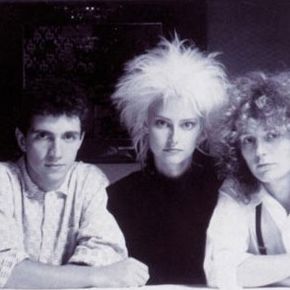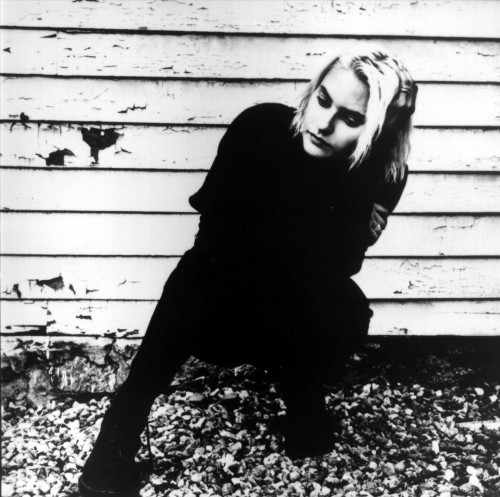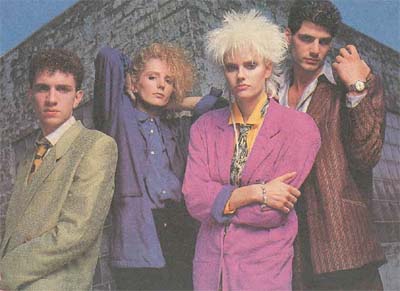
For the rich possibilities of dialogue between 80s New Wave and the old, old story, look no further! This one comes to us from Tyler Beane:
This is a great Aimee Mann tune from the late ’80s when she was still heading the band ‘Til Tuesday. The song is about a gal experiencing what I read as depression following the loss of “a boy,” probably a boyfriend. The song has a lightness to it, a breeziness to the pop. However, when the song moves to the lyrics “This time” in “Why must I take it so hard this time” in the chorus (0:55), there is a different mood. It is a deepening in tone that the whole instrumentation but especially the bass creates. The deepening indicates a darker sentiment than the song initially suggests.
The gal wishes that this time she wouldn’t be so sensitive, wishes that she could breeze on by the loss without getting stuck in a depression. She asks, “Why must I take it so hard this time,” over and over as she wonders whether her depression is her fault, or something that is happening to her and outside of her control. Perhaps she’s fallen before into the grave that depression digs, dirt hardening around her, making it harder for others to reach her.
I’m using multiple definitions of the word “hard” here, and probably beyond the scope of the song’s use of the word, but the song is evocative of these multiple definitions. I personally know the hardness of depression: how hard it was for me to get out of bed in the morning, and how my heart seemed to harden, limiting my ability to interact with the world around me. I remember my mom weeping at one low point my senior year of high school. Somehow she had gotten me up out of bed and into the car at home to drive me to school, but when we got to school she couldn’t drag me out of the backseat of the car. I don’t know exactly the reason for her tears, but I wonder if it was because she couldn’t recognize me: my affect expressionless, my body curled and hardened into the fetal position, refusing to budge. Depression is hard on everybody, not only the depressed person but those attempting to support that person as well. I have moved beyond the debilitating hardness of my depressed young adult years, but my sense memory still knows the contours of that dark place.
Aimee Mann knows my experience. I’d like to ruminate on a few seconds of Aimee Mann’s “Why Must I” to take you into that experience and to share what I’ve always loved about her music. She often tangles with depression in the stories of her character; she traces the shape of depression with her heavy alto vocals and her pathos-filled instrumentation. Yet her songs never stay mired in the muck. There is catharsis in her songs. As I begin to muse on “Why Must I,” I invite you to go with me into the depressive’s space.
The bass line takes us there. For much of the song, the bass bounces joyfully around, complementing the melodic breezy pop, and suggesting a sense of freedom, life well lived. However, check out the way the bass line works in the song at that suggestive moment I mention above 55 seconds into the song. The bass plays deeply, the cymbals crash, and a darker space is opened. For a few seconds, our once-joyful bass sounds the same low dark note.
Depression can feel like the same note played over and over again. For the depressed person, it can be easy to get stuck on those dark notes, revealing an entrenched pessimistic, fearful, and/or anxious way of thinking. Yet there is an odd comfort in the same note being sounded over and over again, even if it isn’t life-giving, because it is familiar, it is mine. The twisted thinking is: no one can keep me from being in my dark place: I am untouchable and alone. No one is going to be able to connect with me anyway, not my parents, not my best friends, not even God, so I’ll own what’s mine: my dark notes. They are what I know, they are what I am.
There is sadness for the depressive: sadness in that I sense life riding the one note and slipping away. I know that I have other notes I could sing, but I’ve forgotten how to sing them. I’ve forgotten even what the notes sound like. God has given me polyphony to experience, but I am mired in the monophony of my dead chant. One note played over and over again isn’t really even music. There is another sadness with the one note thinking of the depressive: it’s hard for others to connect with me. When I’m buried underground; my one note sounds dull and distant to those above. It is difficult and frustrating for others to make music with me. I am too far gone from my life to notice, buried, hardened. I know my music-making ability is severely weakened; all I have— all I am— is a broken bell, tolling one rigid, soulless tone.
 In “Why Must I,” new life is found for the depressed gal in the bassline at 0:58 and 0:59. The briefly stuck bassline wiggles out of its repetition, wiggles— using earthen imagery— like green buds bursting out of the coarse earth. The song propels forward. The girl moves to a second verse of musing and our beloved bassline resumes its joyful bounce.
In “Why Must I,” new life is found for the depressed gal in the bassline at 0:58 and 0:59. The briefly stuck bassline wiggles out of its repetition, wiggles— using earthen imagery— like green buds bursting out of the coarse earth. The song propels forward. The girl moves to a second verse of musing and our beloved bassline resumes its joyful bounce.
The deadness expressed in “Why Must I” is only a glimpse of the depressed life, closer to mere suggestion than full expression. However, when I was in the throes of my depression in high school, I appreciated Aimee Mann’s subtle hints of the darker life, maybe moreso than I would have a dirge. Aimee Mann expressed a full slate of life’s emotions in songs like this one, and in songs like “Build That Wall” and ‘TIl Tuesday’s “Coming Up Close.” She didn’t let her songs be swallowed up by one feeling, allowing for darkness and joy and a lot of emotions in between. The healthy spirit doesn’t shut out sadness; it sings sadness as one note among many.
When I was stuck in my one-note depression, I would hole up in the basement of my house and put Aimee Mann on repeat, tracking again and again the songs’ movements, darker and cathartic moments both. I tried to will myself forward through the dark tunnel of depression using song. Aimee would sing me through. What I realize now that I didn’t realize at the time is that I could not will myself not to be depressed. For me, depression is a disease; it is not a choice. I did not choose to be depressed; depression runs in my family and whether or not I wanted it, it came for me and took me down into the pit. Another wondering I have now is that I’m not sure playing the same song over and over again was helpful. With repetition, the once life-giving hook or lyric— like a wilted flower— deadens and blows away in the wind.
Yet the song remains powerful to me as I return to it now and connect it to my experience of depression. I realize that there may be a difference between my depression and that of the grieving lover. Every depression is different: some are of circumstance, some of genetic disease, some of a combination. I cannot hope to diagnose the cause of the gal’s depression in “Why Must I.” But, I sense her struggle and identify with her wondering why her life is so hard. I have shouted that question at God from the grave depression dug for me. The song’s protagonist became for me a companion in my struggle. Furthermore, the musical lyrics and notes became for me the Word of God, offering hope in the smallest thing: a bouncing bass line. As I reflect on my own journey, I reflect on the times when my bassline has bounced, freely experiencing a full slate of sound, and I reflect on the times when my bassline has slimmed to the one note, low, dull drum.
A blessing presents itself from the imagery available: My hope is that whenever a depression looms and forces us into a dark tunnel in the earth of our lives, we might find the courage and strength to wiggle forwards, not knowing when the tunnel will end but feeling God there with us in the wiggle. The gal in the song ascribes a numbing effect to belief in god, the same that she ascribes to the alcoholic’s bourbon. My hope is that we might find in God the opposite: a companion Spirit that even in the darkest moments sings into us an invigorating song.
http://www.youtube.com/watch?feature=player_detailpage&v=UIyRuMXI7Fk&w=600

COMMENTS
3 responses to “Why Must I (Be Depressed?): ‘Til Tuesday’s Gracious Introspection”
Leave a Reply














Tyler- Thank you for this post, and for your vulnerability in it. Really powerful stuff.
I’ve long been an Aimee fan, but never dug into Til Tuesday beyond the big hits. But these are fantastic! Would love to see what kind of a playlist you might suggest for a Til Tuesday novice.
As it happens, I found this site as I was trying to find out more about the assertion in the link below that the song is neither in one key or another. Could that be an effort to boost the sense of ‘not quite rightness’ in the song? Listening to it now, it almost feels like the song is slowed down at times, or at least some of the notes. I think I may be a little tone deaf, or maybe just not very empathic, or I might have picked up on it sooner:
http://similarlyrics.com/aimee-mann/everything-s-different-now/why-must-i
‘Note: For some reason this isn’t in tune… It’s *sort* of between Ebm and Em, closer to Ebm… so…. Capo 1 – Ebm maps to Dm…’
lyrics that dare to capture jump a few years and hear charmer, why not the entire album, ask people to listen, maybe guess who it is, names , til tuesday, aimee , already captured by their names.